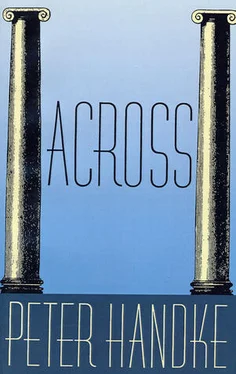Peter Handke - Across
Здесь есть возможность читать онлайн «Peter Handke - Across» весь текст электронной книги совершенно бесплатно (целиком полную версию без сокращений). В некоторых случаях можно слушать аудио, скачать через торрент в формате fb2 и присутствует краткое содержание. Год выпуска: 2000, Издательство: Farrar, Straus and Giroux, Жанр: Современная проза, на английском языке. Описание произведения, (предисловие) а так же отзывы посетителей доступны на портале библиотеки ЛибКат.
- Название:Across
- Автор:
- Издательство:Farrar, Straus and Giroux
- Жанр:
- Год:2000
- ISBN:нет данных
- Рейтинг книги:3 / 5. Голосов: 1
-
Избранное:Добавить в избранное
- Отзывы:
-
Ваша оценка:
- 60
- 1
- 2
- 3
- 4
- 5
Across: краткое содержание, описание и аннотация
Предлагаем к чтению аннотацию, описание, краткое содержание или предисловие (зависит от того, что написал сам автор книги «Across»). Если вы не нашли необходимую информацию о книге — напишите в комментариях, мы постараемся отыскать её.
Across — читать онлайн бесплатно полную книгу (весь текст) целиком
Ниже представлен текст книги, разбитый по страницам. Система сохранения места последней прочитанной страницы, позволяет с удобством читать онлайн бесплатно книгу «Across», без необходимости каждый раз заново искать на чём Вы остановились. Поставьте закладку, и сможете в любой момент перейти на страницу, на которой закончили чтение.
Интервал:
Закладка:
But the politician himself was lost, and more visibly than the rest of us, with eyes agape and beads of sweat on his hairline. The worst of it was that he refused to acknowledge his inability to cope with the situation, and kept on trying. Yet it was just this that brought the others together! While, a moment before, they had been staring into space, they now exchanged covert glances and even smiles, and stretched out their legs under the table in relief. Nothing was lacking but the one word that would have saved the day. But then, quite inexplicably, salvation came, brought by someone’s casual remark about the coming of Easter: “In three days, the bells will ring again.” That was the turning point. With a sense of release, we played a last hand and went downstairs to the dining room for dinner.
After the meal, the master of the house suggested making a fire in the fireplace, and each of the card players wanted to light it. The almost white beech logs lay in a disorderly pile in the wide entrance hall. One player after another carried a few of them in and put them down near the fireplace. All this time, a teenager, the son of our host, was standing outside at the hall telephone, with his back to the wood carriers, pressing the phone to his ear without so much as a glance at all the disturbance. (“It’s been going on like this since the beginning of his vacation,” said the boy’s father.)
The table had been cleared, the door was closed, the fire was burning, the card players sat drinking wine, the predicted snow (“the last snow,” someone said) came flying out of the darkness and beat against the windowpanes, which crackled at first, then were silent, as though a tension in the glass had been relieved; the son in the hallway kept mumbling into the telephone. Each one of the downward-swarming snowflakes was a symbol, undefined and undefinable.
I tapped my temples with my fingertips, as though to relieve some pressure or pain, pushed back my chair, and turned to the priest: “Do thresholds occur in the religious tradition?” I asked him. — “Literally or figuratively?” —“Both.”
While the priest pondered, the others said whatever came into their heads.
The master of the house: “Our cat here never runs thoughtlessly over a threshold. It always stops first and carefully sniffs the ground. Sometimes it avoids contact with the threshold and jumps. It’s only when escaping from a dog, for instance, that it loses no time in crossing a threshold; all it wants is to be inside. Then of course it’s the pursuer that hesitates.”
The politician: “I have two sorts of recurrent dreams about thresholds. In the first, I’m in my stocking feet; I slide off the threshold because, regardless of whether it’s wood or stone, it’s exceedingly smooth and rounded at the edges. But I always get to the other side safely, and my fear helps me. In sliding off, I ask myself: Where am I? And precisely because of my fright, I know where I am. In this case, the threshold is something like the take-off board in the broad jump. In the other sort of dream, it’s just the threshold of a room, a mere strip of metal such as you often find in new buildings. But I’m incapable of crossing it. In the whole dream, nothing happens, just that I’m standing by the open door, looking at my face, which is reflected in the metal under me. Once, when I managed to turn around, I saw behind me a glass cage full of simultaneous interpreters, all waiting for me to start making my speech.”
The painter: “Two ancient peoples were such bitter enemies that when one had defeated the other, it smashed the statues in the other’s temples and used the stone for paving its thresholds at home. In some cultures, we find labyrinth designs outside the thresholds; their purpose, we are told, is not so much to protect the threshold as to make intruders stop and consider a detour. To me personally, thresholds are no problem. I’m not mature enough for that. Nevertheless, I’ve sometimes thought: If there are paintings over doorframes, why not build thresholds and make them more recognizable by means of colored forms? We’ll see.”
By then, the priest had collected his thoughts. “To the best of my knowledge,” he said, “the tradition has little to say of the threshold as a material object. One of the prophets predicts that the temple will tremble so violently that even its stone threshold will be lifted. As an image, however, it occurs time and again, though as a rule a different word is used. In the indexes of works on the subject, threshold. usually refers us to door. The threshold and the door (or gate) are seen as parts standing for the whole. In the Old Testament, the whole is the city: in one passage, the mere earthly city—‘Howl, O gate; cry, O city!’; in another, the heavenly city—‘The Lord loveth the gates of Zion more than all the dwellings of Jacob.’ In the New Testament, the gate stands in one passage for perdition—‘the gates of hell’; in another, for salvation—‘I am the door: by me if any man enter in, he shall be saved.’ Thus, the threshold is ordinarily associated with passage from one zone to another. What may be less evident is that the threshold is itself a zone, or rather, a place in its own right, a place of testing or of safety. Isn’t the ash heap where Job sits in his misery a threshold, a place of testing? Didn’t a fugitive put himself under someone’s protection by sitting down on his threshold? Doesn’t the archaic usage of ‘gate’ evoke the threshold as a dwelling place, as a room in its own right? According to modern doctrine, of course, there are no longer any thresholds in this sense. The only threshold still remaining to us, says one of our modern teachers, is that between waking and dreaming, and nowadays little attention is paid to that. Only in the insane does it protrude, visible to all, into daytime experience, like the fragments of the destroyed temples just mentioned. For a threshold, he says, is not a boundary — boundaries are on the increase both in inner and in outer life — but a precinct. The word ‘threshold’ embraces transformation, floor, river crossing, mountain pass, enclosure (place of refuge). According to an almost forgotten proverb: ‘The threshold is a fountainhead.’ And this teacher says literally: ‘It was from thresholds that lovers and friends absorbed strength. But,’ he goes on, ‘where nowadays are we to find the destroyed thresholds, if not in ourselves? By our own wounds shall we be healed. If snow stops falling from the clouds, let it continue to fall inside me.’ Every step, every glance, every gesture, says the teacher, should be aware of itself as a possible threshold and thus re-create what has been lost. This new threshold consciousness might then transfer attention from object to object, and so on until the peace relay reappears on earth, at least on that one day — and on the day after and the day after that, rather as in the child’s game where stone sharpens scissors, scissors cut paper, and paper wraps stone. Thus, thresholds as seats of power may not have disappeared; they have become conceivable, so to speak, as inner powers. If man were conscious of these thresholds, he would at least let his fellow man die a natural death. Threshold consciousness is nature religion. More cannot be promised.”
The priest pulled himself up in his chair and looked around, as though preparing to go on with his sermon, but then laughed as though surprised, exhaled, inhaled deeply, and told us how he had just remembered the stone threshold at home, on which he had often sat “bare-assed.” This threshold had been a granite block, not in the house but in the wooden barn. The threshold of the house was a simple pinewood board with an unusually deep knothole in it; he and his brothers and sisters had often sat there playing marbles in rainy weather. They had sometimes scraped their fingers on the rough board or got them full of splinters, which later festered.
Читать дальшеИнтервал:
Закладка:
Похожие книги на «Across»
Представляем Вашему вниманию похожие книги на «Across» списком для выбора. Мы отобрали схожую по названию и смыслу литературу в надежде предоставить читателям больше вариантов отыскать новые, интересные, ещё непрочитанные произведения.
Обсуждение, отзывы о книге «Across» и просто собственные мнения читателей. Оставьте ваши комментарии, напишите, что Вы думаете о произведении, его смысле или главных героях. Укажите что конкретно понравилось, а что нет, и почему Вы так считаете.












